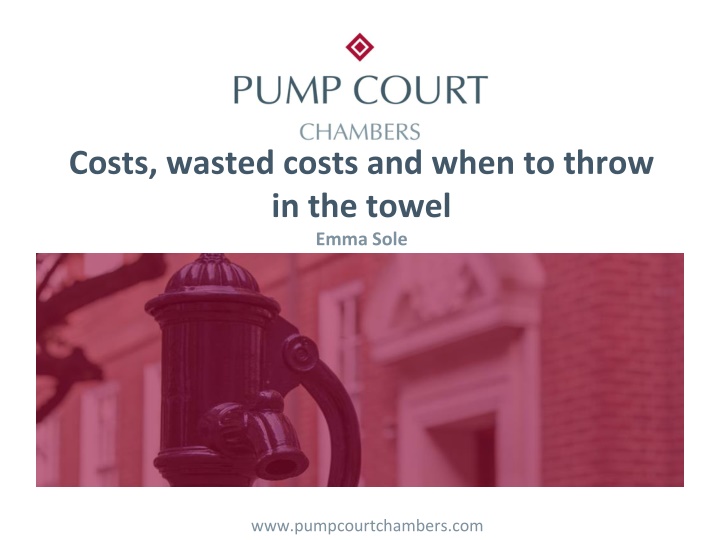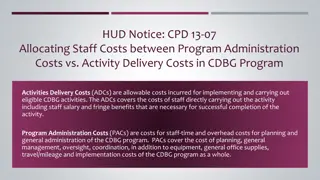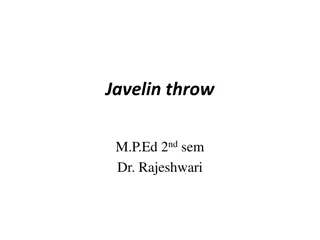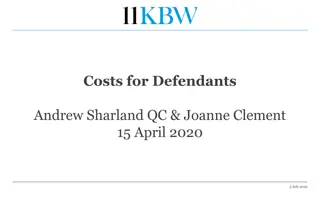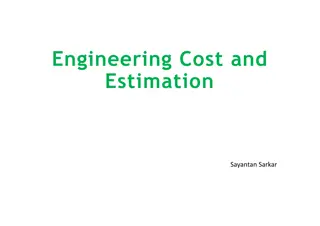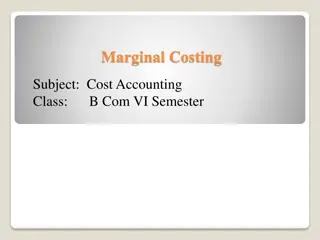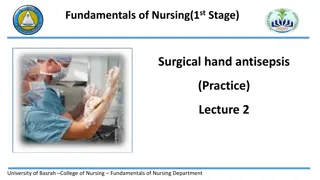Costs, wasted costs and when to throw in the towel
Discretionary power of the Tribunal to award costs, the two-stage test involved, and circumstances where costs may be ordered or not. Learn about the financial benefits and tactical considerations when dealing with costs.
Download Presentation

Please find below an Image/Link to download the presentation.
The content on the website is provided AS IS for your information and personal use only. It may not be sold, licensed, or shared on other websites without obtaining consent from the author.If you encounter any issues during the download, it is possible that the publisher has removed the file from their server.
You are allowed to download the files provided on this website for personal or commercial use, subject to the condition that they are used lawfully. All files are the property of their respective owners.
The content on the website is provided AS IS for your information and personal use only. It may not be sold, licensed, or shared on other websites without obtaining consent from the author.
E N D
Presentation Transcript
Costs, wasted costs and when to throw in the towel Emma Sole www.pumpcourtchambers.com
The exception and not the rule? In 2020/2021 the number of cases in which costs (not wasted or preparation) were awarded was 111. In 2022/2023 it was 195. The relative number of cases disposed of by the ET was 41,622 and 70,933. 2020/2021 2022/2023 Costs No Costs Costs No Costs around 0.2% in each case.
Sowhat is the point? 1) The possible financial benefit. The highest costs award in 2022/2023 was 174,141. In 2021/2022 it was 600,673. However, the median in both of those years were 3,700 and 2,500 respectively. 2) Tactical considerations/negotiation.
ET Rules, Sch 1 (2013) Rule 76 Costs are the exception not the rule. The Tribunal has the discretionary power to make a costs order in the following circumstances ( the threshold tests ) Party has acted vexatiously, abusively, disruptively or otherwise unreasonably in either the bringing of the proceedings or the way in which the proceedings have been conducted. Where a claim or response has no reasonable prospect of success. If a hearing is adjourned on application by a party, less than 7 days before the hearing. Where a party is in breach of an order or practice direction, or where a hearing is adjourned. A Tribunal must order costs where C has communicated a wish to be reinstated or re- engaged, not less than 7 days before the hearing, and the hearing has been adjourned due to R s failure, without special reason, to adduce reasonable evidence as to the availability of the job from which C was dismissed or of comparable or suitable employment. Rule 77 An application for costs can be made at any time, up to 28 days after judgement.
A two-stage test Where an application is made for a costs order under the discretionary powers the Tribunal will consider two stages: 1) Has at least one of the threshold tests in r.76 been established? 2) If so, is it just to exercise discretion to award costs? The purpose is to compensate the receiving party not to punish the paying party. The Tribunal cannot take into account the fact of a receiving party having an insurance policy but may have regard to the paying party s ability to pay when deciding whether to make a costs order at all (r.84). Only if these two questions are answered in the affirmative will the Tribunal then go on to consider the amount of an award (which can also take into account the paying party s ability to pay).
Vexatiously, abusively, disruptively or otherwise unreasonably (1) Such behaviour is not statutorily defined and there is no authoritative list of offending behaviour. The Presidential Guidance on General Case Management 2018 states only that: Each case will turn on its own facts. Examples from decided cases include that it could be unreasonable where a party has based the claim or defence on something which is untrue. That is not the same as something which they have simply failed to prove. Nor does it mean something they reasonably misunderstood. Abusive or disruptive conduct would include insulting the other party or its representative or sending numerous unnecessary e- mails. Daleside Nursing Home Ltd v Mathew UKEAT/0519/08: EAT found a decision not to award costs was perverse, where C s allegation of a key, racist remark was, the EAT said, 'a deliberate and, to an extent, cynical lie . However, the CA in Arrowsmith v Nottingham Trent University [2012] ICR 159 at [33], confirmed that there is no principle of general application that lying, even in respect of a central allegation, must inevitably result in a costs order.
Vexatiously, abusively, disruptively or otherwise unreasonably (2) Kopel v Safeway Stores plc [2003] IRLR 753: 5,000 costs awarded against C, where she rejected a generous offer, but persisted in pursuing claims under the HRC and lost her unfair dismissal and sex discrimination claims. A Tribunal must, however, first conclude that the conduct in rejecting the offer was unreasonable, before determining whether to make costs under r76(1)(a). Similarly, when considering whether an award of costs should be made against a claimant who withdraws their claim, the crucial question is whether they have acted unreasonably in the conduct of the proceedings, not whether the withdrawal of the claim is itself unreasonable McPherson v BNP Paribas (London Branch) [2004] IRLR 558.(N.B. r.51). Tan v Copthorne Hotels Ltd ET 2200986/2017: In 2020 the ET order Mr Tan to pay over 430,000 to his ex-employer in costs, following the dismissal of his claims in 2018. Various criticisms were made of Mr Tan, including that one of his claims was a fishingexpedition and that he had taken a scattergunapproach in referring to every possible claim he could think of. The strongest criticism related to Mr Tan s admission that he had made tens of hundreds of hours of covert recordings of colleagues which was described as deceitful, duplicitous and underhand and held that this would have eroded any trust and confidence. Despite the power to make wasted costs awards, a party may themselves be rendered liable to pay costs because of their representative s conduct. What is done in a party's name by a representative is presumptively, but not irrebuttably done on their behalf (Bennett v London Borough of Southwark [2002] IRLR 407 at [26]).
Quantum: Costs & Preparation time orders (1) Either a costs order or a preparation time order. Costs orders in the ET are capped at 20,000 or else subject to detailed assessment. "Preparation time" simply means time spent by the receiving party working on the case, including time spent by any of their employees or advisers, when not legally represented and is calculated as follows: 1)The Tribunal must first make an assessment of the number of hours that have been spent on preparation time (based on what the receiving party asserts and the Tribunal s own assessment). 2)Multiply that figure by 33 (a figure that changes each year). 3)As with costs orders, a paying party s ability to pay may be taken into account when considering both whether to make a PTO and the amount.
Quantum: Costs & Preparation time orders (2) Where an order is made on the ground of unreasonable conduct, the discretion of the Tribunal is not causally tied to awarding only those costs incurred as a result of the specific, unreasonable conduct. In McPhersonMummery LJ explained that: 'The principle of relevance means that the tribunal must have regard to the nature, gravity and effect of the unreasonable conduct as factors relevant to the exercise of the discretion, but that is not the same as requiring [the receiving party] to prove that specific unreasonable conduct by [the paying party] caused particular costs to be incurred Mummery LJ latterly explained in Barnsley Metropolitan Borough Council v Yerrakalva[2012] IRLR 78 at [40] that this passage did not mean that, either questions of causation are to be disregarded or that tribunals must: 'dissect a case in detail and compartmentalise the relevant conduct under separate headings The vital point in exercising the discretion to order costs is to look at the whole picture of what happened in the case and to ask whether there has been unreasonable conduct by the claimant in bringing and conducting the case and, in doing so, to identify the conduct, what was unreasonable about it and what effects if had'.
Wasted costs: Principles Rule 80: A Tribunal may make a wasted costs order against a representative where the party has incurred costs: (a) as a result of any improper, unreasonable or negligent act or omission on the part of the representative; or (b) which, in the light of any such act or omission occurring after they were incurred, the Tribunal considers it unreasonable to expect the receiving party to pay. Does not apply to an employee representative. Privilege may prevent representative from explaining their case. Ridehalgh v Horsefield and another [1994] Ch 205 1) Did the representative act improperly, unreasonably or negligently? 2) If so, did that conduct result in the party incurring unnecessary costs? 3) If so, is it just to order the representative to compensate the party for the whole or part of those costs?
Wasted costs: Examples Employment Rights Advice Ltd v Vernon and Volksmaster Ltd UKEAT/0072/18 ERA Ltd misled the tribunal by incorrectly stating that an application for fee remission had been made. Dimayuga v Epsom & St Helier University Hospitals NHS Trust ET/2300197/18 - withdrew at 10pm on the day before the final hearing despite having been put on notice 5 days earlier that the client would not attend. Godfrey Morgan Solicitors Ltd (In a matter of a Costs Order) v Cobalt Systems Ltd UKEAT/0608/10 - solicitors did not inform the other side that the claim had been withdrawn until a few days before the hearing.
When to throw in the towel Consider each of the following: Cost to the client of pursuing the application versus the likelihood of success in the application and recovery of the costs in any event. Is a separate hearing required? Is evidence going to be called? Is this a genuine exception to the rule or, simply, the normal cut and thrust of litigation? If the application is premised on there being no reasonable prospects has an early application for strike out or a deposit order been suggested? Consider too: The need to balance the requirement for a costs warning versus the potential impact of sending the same on, for example, a LIP. Does a weak costs warning letter yield its own costs risks?
e.sole@pumpcourtchambers.com www.pumpcourtchambers.com
